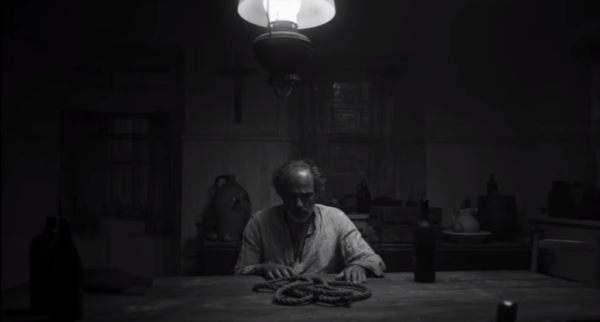
Photo via Facebook
The Opening Gala of this year’s Victoria Film Festival was a tastefully curated event. Hosted in the lobby of the Bay Centre, it featured a range of cocktails and appetizers that fit with the Scottish theme of the opening film Waterboys (2017). Something I love about festivals is the way that they bring together such a wide variety of people who all share a common enthusiasm, and I felt lucky to dress up and socialize with a community who were all as enthusiastic about movies as I am.
A co-production from the Netherlands and the U.K, Waterboys tells the story of an estranged father and son who reconnect during a trip to Edinburgh. The entire film is structured around the music of a real Scottish folk/rock band called the The Waterboys. Director Robert Jan Westdijk introduced the film, which was making its Canadian debut. Westdijk grew up with the band’s music and it was this experience that inspired him to write the story that became the film. Waterboys is a thoughtful meditation on modern love, relationships, and the creative process. While the narrative is relatively conventional and the humour rather gentle, it is well-acted and there are some subtleties about the characters that make for a pleasant — if somewhat underwhelming — viewing experience.
The variety of films and programs within the festival schedule meant that there was truly something for everyone, and as a film student, I am grateful that such interesting, film-related events are being brought to Victoria. I look forward to seeing what is in store for next year.
In contrast, The Little Girl Who Was Too Fond of Matches (2017), created by Quebecois director Simon Lavoie, is a dark tale of family destruction and devolution. Lavoie adapted his film from the critically acclaimed 1998 novel of the same name. Set in rural Quebec in the 1930s, Matches focuses on two children raised by their father in a country farmhouse, completely isolated from society. After their father’s suicide, the children struggle to navigate the isolated reality that their father had constructed for them, fearful of stepping outside into the larger world. As the plot evolves, a past family tragedy that is the source of all the twisted events within the story is slowly revealed. This allows the viewer to slowly piece together the complex chain of events leading to the present narrative, creating a sense intrigue and suspense. Visually, the film is quite beautiful, featuring stark black and white images. However, overt images of horror, violence, and sexual abuse dominate the film, creating a sense of dissonance in the viewer.

Screenshot from Youtube
Films like this lead me to question when and how it is appropriate to depict trauma onscreen, and when these images may be gratuitous. In the case of Matches, I left the theatre wondering how stories about the pain and suffering of girls and women can be told with integrity—and it seems that the answer to this question can be found in how and why and by whom the story is told. Given the current cultural emphasis on examining how patriarchal perspectives are embedded into our forms of storytelling, I reviewed this film with a critical inner eye.
The Matches novel was written by a male author, yet the entire story is centred around the abuse and oppression of its young female protagonist. To have this story adapted for the screen, once again by a male director, leads me to wonder what audience this film is meant to benefit. I cannot say with confidence that the addition of more imagery which perpetuates a culture of violence against women is justified by whatever unclear ‘message’ or creative agenda the director was hoping to portray.
One of the greatest strengths of the Victoria Film Festival is that it focuses on screening cinema from a wide range of perspectives. This year, the program highlighted a variety of Canadian films — Ontario-based experimental filmmaker Mike Hoolboom’s We Make Couples was a notable addition — with a focus on featuring Indigenous works — Alanis Obomsawin’s latest documentary Our People Will Be Healed is not to be missed, and Hochelaga, Land of Souls provided a new and illuminating perspective on an influential period of Canadian history. A wide selection of international pieces were also showcased, and films like The Party and Oh Lucy! provided engaging storylines while encouraging diverse aesthetic experiences outside of the North American cinematic canon.
This will have been my third year attending VFF, and I would happily say that it was probably my best experience yet! The variety of films and programs within the festival schedule meant that there was truly something for everyone, and as a film student, I am grateful that such interesting, film-related events are being brought to Victoria. I look forward to seeing what is in store for next year.






